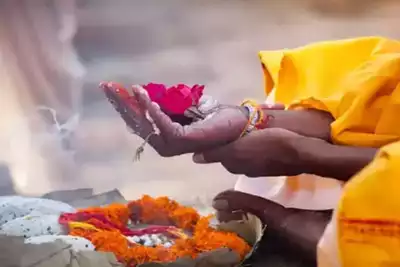Pitru Paksha, Fortnight of Ancestors
Pitru Paksha, also known as “Fortnight of Ancestors”, is the ritual of Pitru Paksha which falls during the Indian lunar month of Bhadrapada, which usually falls in the Gregorian calendar of September and October. In 2024 this fortnight will be from Sunday, September 17th to Sunday, October 2nd.
Hindus are bound by their religion or dharma to pray for the soul of their ancestors. They have to repay this debt to be happy. During Pitru Paksha or Shraadh, a period of 16 lunar days in the Hindu calendar, which begins on September 17 this year, people offer prayers, food and water to their ancestors. According to the sacred writings of the Gita and the Vedas, offerings made to the departed during Pitru Paksha bring peace to their souls and help them reach their divine destination.
Hindus believe that the departed wander in the region between heaven and earth (‘Pitru Lok’). Here, they are restless and still attached to worldly life (‘Maya’). Prayers and ritual offerings during Pitru Paksha liberate the souls and help them move towards ‘Brahmaloka’ or heaven. After the death of Karna (Mahabharata), his soul is served food made of gold and silver. His hungry soul realises that this is because of his deeds. When Karna was alive, he had donated gold and silver, but not food. His soul prays and returns to earth to donate food for a better life.
English philosopher-scientist Herbert Spencer wrote in ‘Principles of Sociology’ that ancestor worship is the root of every religion. Like Pitru Paksha, on the Day of the Dead too people pray for their ancestors. In 2008, this tradition was inscribed in the Representative List of the Intangible Cultural Heritage of Humanity by UNESCO. It is believed that during Pitru Paksha, feeding and caring for the needy creates good karma that helps the departed rest in peace. What a great way to play your part. One must explain the importance of Pitru Paksha to their children and let them know that a good Hindu has respect and love for his parents, grandparents and elders.
This 16-day period is considered an unfavorable time to start a new venture, get married, buy a house or a car. It is believed that those who adopt Hinduism will get the blessings of the ancestors. Those who do not offer food and water to their ancestors during Pitru Paksha will get nothing in the afterlife. Pitru Paksha is also the time when Hindus can wash away the sins inherited from their ancestors by performing rituals and offering tarpanas. Offering tarpanas to crows is considered a virtuous act. This is a good sign as crows are considered to be representatives of Yama, the god of death.
Traditionally Pitru Paksha was performed only by men, especially sons, but times have changed. In families where there are no sons, daughters can perform Pitru Paksha.
I feel that there are strong karmic connections between past, present and future unborn generations. We are indebted to our ancestors. When we honor them by praying for the peace of their souls, we receive their blessings.
I personally believe that death is not the end in itself but it just puts a pause to the cycle of birth and rebirth and Pitru Paksha marks the end of a person’s physical body. For the soul, the journey ahead is determined by each person’s individual karma, which was earned during his or her lifetime
Article written by and Editorial credit: State Bureau Chief Himanshu Nauriyal.
